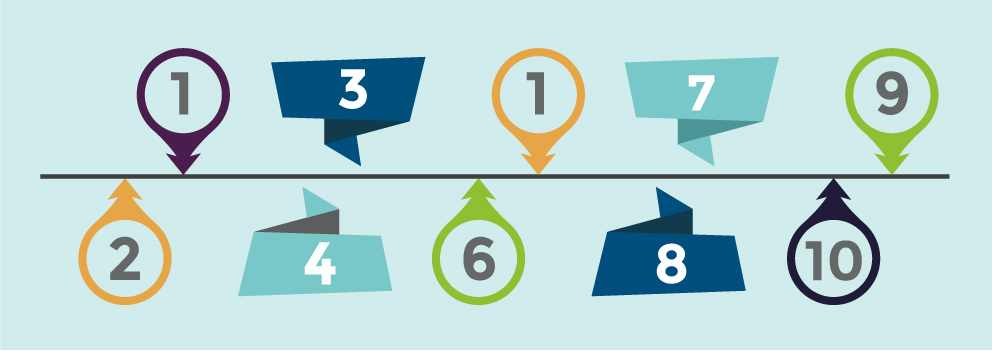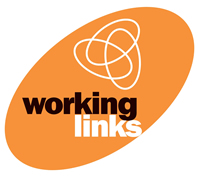Careers advice and information for Brighton
Job - Ready, Set, Go!

Sometimes job hunting and interviews can seem like a giant mountain to climb, especially if you have been out of work, or worked in the same job, for a long time. But the more job-ready you are, you'll find looking for, and getting, the job you want is much easier.
Where to start?
Before you start contacting employers, make sure you have these essential things in place:
- CV. Is yours up-to-date and well-presented? Your CV sells YOU, so make sure it gives the best impression possible. Make sure you have lots of copies if someone asks to see it. If you don't have one to hand you might look disorganised or unmotivated.
- Interview clothes. Do you have smart clothes to wear? First impressions are important!
- References. This can come from anyone who knows you personally or professionally (except relatives). It's good to have one of each, but not essential. Make sure you ask them first and check their contact details are correct.
- Access to a phone. Can employers contact you easily?
- Time. Are you spending enough time on your job search? Are other commitments getting in the way? It is helpful to put aside a specific time each day to job search. We recommend at least 16 hours, or two days, a week. Treat your job search like a real job!
- Free support and guidance. Job searching can be daunting, so take advantage of the free help on offer. At Working Links we provide a dedicated consultant and before-and-after constant care to make sure your job search goes smoothly.
Improve the odds
How do you increase your chances of getting an interview?
- Start by thinking about the skills and experience you have. Then think about the type of job you want. Do your skills and experience match the requirements of the job? Ask someone for an honest opinion of you. It might be very different from how you view yourself. You might think you're shy – they might think you're a great listener!
- Don't limit yourself to just one specific job– the most employable people are those with 'transferable skills', meaning skills which can be applied to a wide range of jobs. For example, you might have been a childminder looking after lots of children, which means you are good at organising yourself and others – also useful for office and secretarial work.
- If you are missing key skills and experience, don't give up. Find out about the training and courses available to you – lots of these are free. Voluntary work is a great way to get work experience.
- Be realistic. Go for jobs you have a realistic chance of getting but make sure you don't undersell yourself. Ask your consultant for help if you aren't sure.
A-hunting we will go
- Keep a diary of your job search. Write down the companies you are interested in, the companies you have contacted, the closing dates for applications, interview dates and so on. It'll help you stay on top of everything so you don't miss anything important, and keep you motivated.
- Because vacancies are advertised in many different places, and there is no single newspaper or website where everyone advertises, make sure you look in all the possible places for new jobs. Local newspapers, company websites, recruitment agencies, specialist trade magazines and online job listings such as Guardian Jobs are all good sources of new vacancies.
- Speculate! If you are interested in a company, call them and introduce yourself. Send in a CV (within 24 hours) and follow it up with a phone call in a few days. Call them every 6 weeks to 3 months to find out about new vacancies. Sometimes companies don't even advertise new jobs if they have good CVs on file, and by keeping in contact you'll stand out from the crowd.
- Review your progress. If you aren't getting anywhere, try and work out why. Perhaps you are applying for too few jobs, or your CV has spelling mistakes in it.
Invitation to interview
You've made it! Your hard work has paid off and you have been invited to interview. You will be up against the best candidates who applied for the job, but remember, that includes you so stay positive. Follow these tips for interview success.
- Your consultant will help you prepare with a mock interview, which will help you identify your strengths and weaknesses. Or ask a friend who interviews people on a regular basis to step in.
- You will be asked questions about the company so research them thoroughly and impress them with your knowledge. Use the internet, your consultant, friends and local libraries to find out what you need.
- Think of questions to ask at the interview - employers will be impressed.
- Plan your route beforehand – practise the journey if possible. Arriving late without a very good reason will put you at a disadvantage and won't give a good impression.
- Telephone and confirm your interview with the person who has written to you when you receive your letter. If you can't make it, let the company know as soon as possible.
On the day
You're bound to be nervous, but think positive. If you've done all your preparation and research there's no reason to worry.
- Get a good night's sleep. Do some preparation the day before, but stop and unwind in the evening. Watch a DVD or chat to a friend to take your mind off the interview and help you relax. But resist the temptation to go out – a hangover will undo all your good work!
- Have a good breakfast. If you skip your morning meal, it has a negative physical effect. Your blood sugar levels drop and you will find it much harder to concentrate. And a rumbling tummy might be a little off-putting for the interviewers!
- Set off early. You can always sit and wait with a cup of tea and re-read your CV. Then you will be much more relaxed than if you dashed in one minute before your interview!
- Don't worry if you are nervous. Employers know that interviews can be daunting. Take deep breaths, concentrate on the questions and you'll soon forget your nerves.
- Be positive. Smile and look at the interviewers as you shake hands. Sit up straight and look interested.
- Give details in your answers and use examples to help explain your answers, but don't talk for the sake of it. Once you feel you have answered the question as fully as you can, stop talking and smile. And never interrupt the interviewer halfway through a question – wait until they have finished speaking.
- Tell the truth. If you were dismissed from your last job, be honest. But prepare an answer to show you have learned from your experiences. For example, you could say, 'I realise now that I didn't have the proper skills to do the job they wanted. Now I have taken a training course and feel I am better prepared for the job.' Or: 'I was dismissed from my job for arguing with my boss. I have worked a lot on my anger management issues with my consultant and feel I am now much more capable of responding in an appropriate manner.'
After the interview
- De-brief. Write down your thoughts, feelings, things that went well and things that didn't, and any questions that you had trouble with. Spend one hour on this then stop. It's good to look back and evaluate the interview but over-analysing is counter-productive.
- Treat yourself! Interviews are hard work. Try and arrange for any other commitments to be put off until at least two hours afterwards. Have a bubble bath, buy a nice lunch or play some sports. You've earned it!
- Remember that practise makes perfect. The more interviews you do, the better you get at them. So don't be discouraged if you're not successful the first few times. Make sure you always ask for feedback from the interview so you can see where you can improve and soon – job's your uncle!
Please share this article with your friends on Facebook - thank you.
Much of the advice on our website has been kindly provided by local companies and organisations for which we are very grateful - could you offer some advice to our visitors in return for some free coverage on our website? If so please get in touch here as we'd love to hear from you.
Careers Advice
We work with experts in and around our local area to provide useful information relating to careers advice - we hope you will find these articles to be helpful. You can view our news news archive here

Dealing with Redundancy - Part 5 - Finding a New Job
Once your redundancy is dealt with and any retraining has been undertaken you will probably need to find a new job. This can seem daunting, particularly if you have not had to look for a new
read more
Redundancy - Advice for Employers and Businesses
When we hear the word 'redundancy' it is natural to think of the impact that it will have on the person being made redundant with out regard for the difficulties inflicted upon the employer
read more
Dealing with Redundancy - Part 2 - Financial Advice
Do you know the tax implications of receiving a redundancy package and how to avoid paying unnecessary tax? If you are going to find yourself struggling financially do you know how to lessen
read more
Dealing with Redundancy - Part 1 - Knowing Your Rights
Do you know what redundancy package you are likely to receive? Do you know what the government stipulated minimum package is? As well as detailing the legal and financial aspects we will
read more
Dealing with Redundancy - Part 3 - Psychological Impact
Do you feel like you’ve lost your identity and can’t stop feeling negative? It is not only the practicalities of redundancy that need to be addressed. Redundancy can also have a massive
read more
Top 10 things not to do in a job interview
We've been asking local employers for tips on what to do in an interview – and, of course, what not to do! Here are our top 10 not to do in that all-important job interview.
read more
Dealing with Redundancy - Part 4 - Retraining and Development
Have you thought about a new career or improving upon the skills you currently have? In this article we will offers tips and advice on increasing your 'employability' through courses and
read more
10 Steps to Creating Career Opportunities
It's too easy to start looking in the job section of the paper and applying for everything that has an attractive salary, car or any other perks, before falling into this trap, be really
read moreRemain Positive in Your Job Search
Career advice for Senior Applicants
Keeping things in perspective when things go wrong
Brighton Employment & Business News
When attending interviews it's always good to be up to date with what's happening in the local business and employment sector - we hope you'll find these selected news articles interesting
The Blind Tiger in Brighton faces closure and job losses
Most Brightonians will be aware of the recent petition around proposals for the closure of local popular music venue The Blind Tiger. Based on Grand Parade in Brighton, the club has been having trouble for the past year or so, since a new neighbour moved in to the flat above and began to make noise complaints. The club was served a notice for noise nuisance from Brighton council; if the neighbour complains again of the noise after 19th May 2014, then the venue will be fined big sums of money. ..read more
Part time Jobs in Brighton
It can seem hard to find a job that fits around your life commitments. We are aware that 9 to 5 from Monday to Friday does not be suitable everyone. In fact, statistics demonstrate that the number of people working more than 45 ..read more
Nursing jobs in Brighton
Nursing and care is one of the largest industries in Brighton with several hospitals and many care homes and care facilities in this area. All of these establishments need staffing but how can you set about searching for the ..read more
What not to do in your Brighton job interview
As well as preparing for what you should do when attending a job interview, whether it's a part time job in Brighton or that perfect next step on the career ladder, it is just as ..read more
Top 4 questions asked at job interviews for Brighton job seekers
1. Describe your strengths It is pretty much a sure fire thing that on most Brighton job interviews you will be asked what you think your areas of strength are (and sometimes what you think your ..read more
Interview Tips to help you get that perfect job in Brighton
The Recruitment Process to Fill your Brighton Job
How can you find the right Brighton job for you?
What is different about looking for jobs today in Brighton compared to 10 years ago
Covering Letter hints and tips for when applying for jobs in Brighton
Looking for a second job in Brighton?
University of Brighton / Sussex University
Public Sector jobs in Brighton
Information on local newspapers covering Brighton
Example CV for people applying for jobs in Brighton

Preparing for Interviews
Erica Sosna of The Life Project, Brighton, gives her thoughts on how best to prepare for an interview.
read more
The Positively Focused Job Hunter
When you face the daunting task of searching for a new job, how do you remain calm and motivated when slogging through application after application? Katalin Swann offers some helpful hints
read more